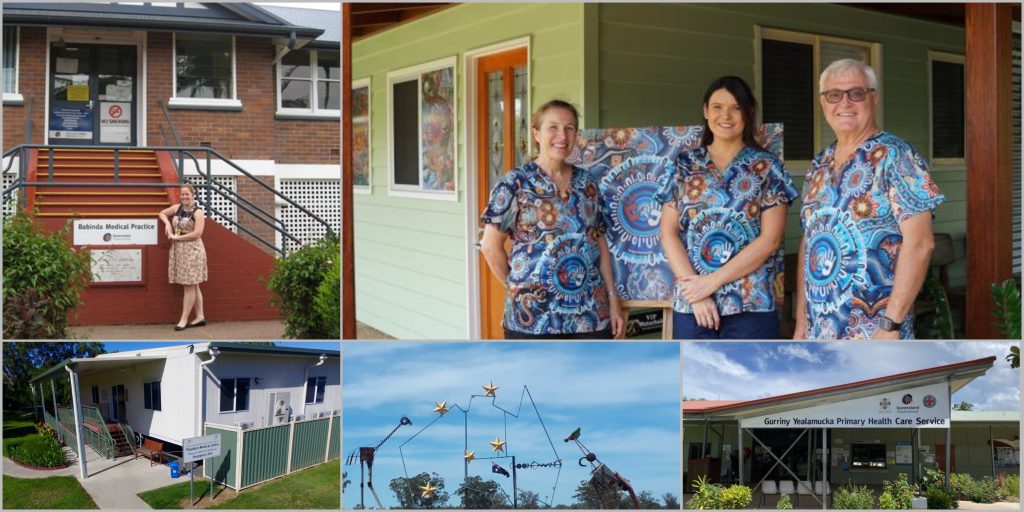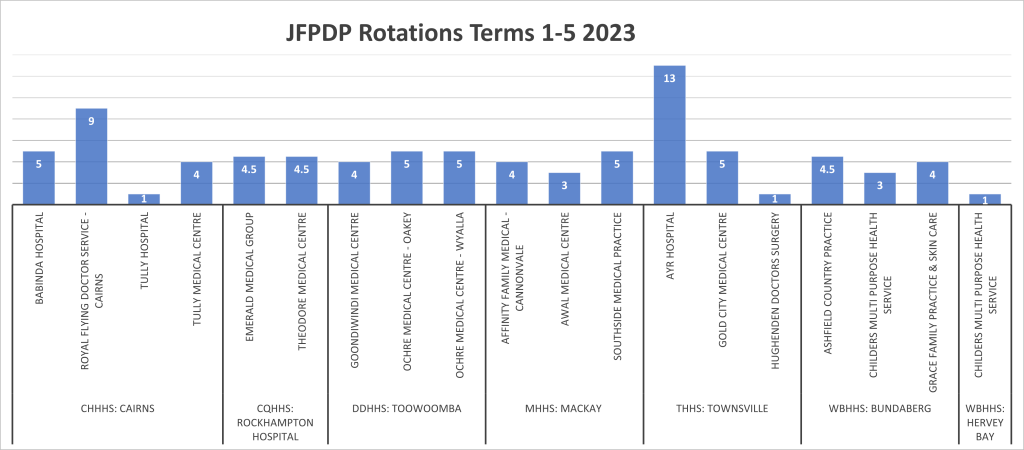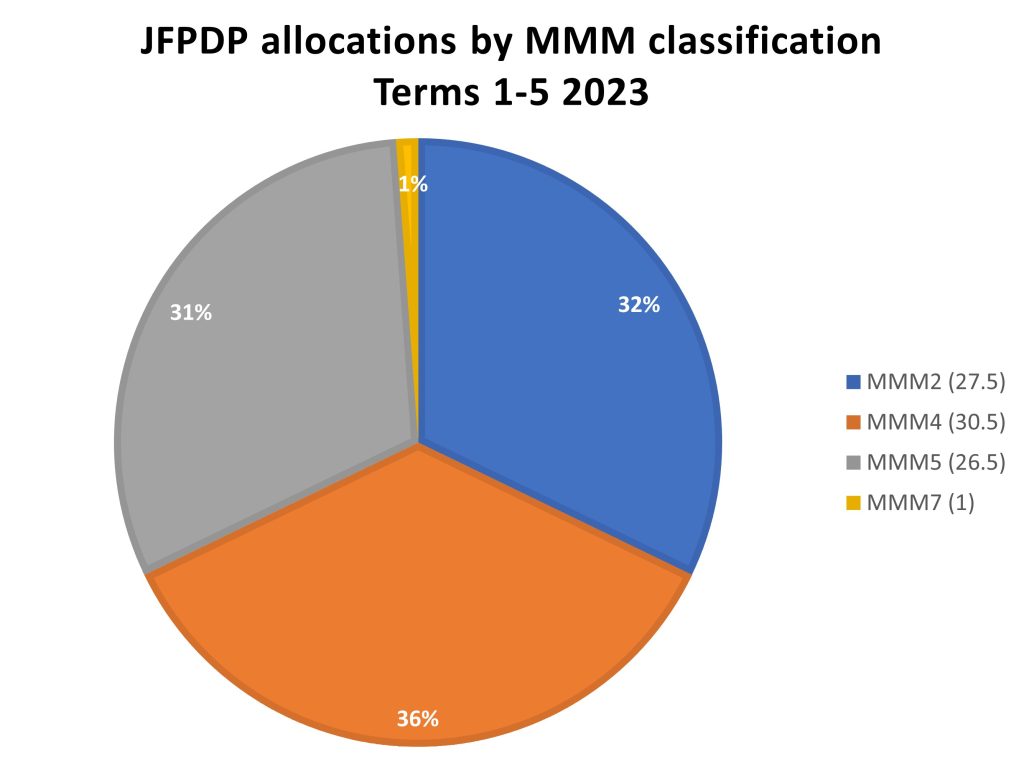
The Commonwealth-funded John Flynn Prevocational Doctor Program (JFPDP) supports eligible prevocational junior doctors to work in rural primary care settings located in Modified Monash Model (MMM) 2-7 areas. Program participants experience living and working in rural communities firsthand and gain insight into the unique benefits and challenges of rural medicine. Rotations range from 8 to 13 weeks and multiple rotations are supported where possible.
The primary objective of the JFPDP is to encourage more junior doctors to consider a career in Rural Generalism or rural general practice. Queensland Rural Medical Service leads the JFPDP in collaboration with Hospital and Health Services (HHS), general practices, GP Colleges RACGP and ACRRM and the Queensland Rural Generalist Pathway (QRGP).
Participating practices
The map below shows the locations where JFPDP rotations can currently be undertaken. The number of available rotations is increasing from 115 in 2023 to 146 in 2025. Practices interested in applying to be considered for JFPDP rotations can learn more in the FAQs section.
Participant information
Junior doctors interested in undertaking a JFPDP rotation should contact their Medical Education Officer at their employing facility for more information about the opportunities available within their HHS region.
Junior doctors participating in the Program can expect a collaborative, responsive network of people around them including the host HHS, the primary care facility and the JFPDP team to offer support and provide a strong foundation to undertake a positive rural or regional primary care rotation.
JFPDP participants will have regular opportunities to check in with our team and will have access to a dedicated JFPDP Connect education session where they can connect with peers, learn about primary care education topics, engage in case-based discussions and access valuable resources to optimise their placement experience.
Hear more about what to expect from your rotation from JFPDP Medical Lead Dr Jaime Hurley.
If your rotation piques your interest and you’d like to know more about what a career in rural medicine might look like, the JFPDP team can connect you with the QRGP’s Rural Generalist Training Advisors who can chat with you further about training options and how they might fit with your personal and professional career intentions.
Data to date
In 2023, the team provided support to 85 junior doctors undertaking 85.5 JFPDP rotations across 19 facilities. Where rotations were unable to be filled in 2023, they have been carried forward to 2024/2025 delivery.

Rotations were predominantly undertaken in primary care facilities in MMM 2, 4 and 5 locations by prevocational doctors in PGY1 to 3 as outlined below.

Of the feedback sought from this group of doctors, 91% indicated they had a good or excellent experience. Their highlights include the learning, supervision and independence experienced as well as the diverse range of patients and presentations treated.
Into the future
Further expansion of JFPDP primary care placement sites is planned for 2024, including those in the Torres and Cape, South West and Central West Hospital and Health service regions. The team is also intending to offer Aboriginal Medical Service placement opportunities.
Together, these new and existing placement opportunities provide early career doctors with great immersive experiences in and exposure to rural medicine across Queensland.
Requirements of participating general practices
To be considered for placement, general practices must meet specific program requirements, including:
- The general practice or primary care facility must be located within a Modified Monash Model (2019) category of MMM2 to MMM7.
- The primary care facility must hold accreditation as a training location by the Australian Medical Council i.e. accredited for vocational training with RACGP and / ACRRM.
- For the placement of Interns (PGY1), the primary care facility must also be accredited for Intern training by Prevocational Medical Accreditation Queensland (PMAQ). This requirement does not apply to prevocational junior doctors in PGY2 or above.
- General practices need to execute contracts with both the supplying Hospital and Health Service (HHS) and the JFPDP Program Manager (Darling Downs Health).
- Eligibility is extended to all prevocational junior doctors up to and including PGY5.
- PGY2 Junior Doctors on Australian General Practice Training (AGPT) are also eligible, subject to certain conditions including assurance given that they can continue to meet their learning requirements and that there is no disruption in the duration of training in their discipline. Approval from the Commonwealth Delegate is necessary for participation. PGY3+ trainees enrolled in vocational training programs are ineligible.
Practices must ensure that junior doctors are supervised by general practitioners while on placement. The Commonwealth expects that supervisors will provide a safe and positive experience while on placement which promotes and supports:
- The safety of patients, practice staff and other clinicians;
- The well-being and safety of the prevocational doctor;
- The delivery of competent medical care; and
- A constructive feedback process and critical reflection
In short, the expectation is that junior doctors are on an experiential rotation to demonstrate the value of pursuing careers in rural medicine.
Benefits for participating general practices
General practices hosting the program will receive a prevocational junior doctor for a duration of 8 to 13 weeks. Throughout the placement, the junior doctor remains an employee of their respective HHS. The supplying HHS will be in contact to advise the details of who will undertake a rotation to the general practice. On occasion, there may not be someone available to participate.
The receiving primary care facility will receive funding to cover costs related to clinical supervision, furniture and IT, and practice support. However, costs such as junior doctor salaries, accommodation and travel will remain the responsibility of the employing HHS. The funding is fixed and provided based on the approved categories outlined by the Commonwealth. The JFPDP cannot allocate funds for any additional expenditures.
Medicare billing and services
During their placement, JFPDP participants are unable to bill Medicare for services. Patient consultations conducted by junior doctors remain under the supervision of the attending general practitioner or rural generalist who can bill Medicare for these services. Junior doctors, however, are permitted to use a refer and request Medicare Number under the JFPDP program. Application for this Medicare Number will be made by the employing HHS prior to placement.
JFPDP’s focus is as a training and attraction strategy; not a workforce program.
Expressing interest to participate
General Practices and primary care facilities interested in participating in the JFPDP and hosting junior doctors should email their interest to JFPDP@health.qld.gov.au. A member of the program team will collaborate with your practice to ensure compliance with program requirements and seek advice on the proximity and capacity of potential supplying HHSs to partner with.
In addition to the support provided by your employing facility, the JFPDP team will contact you prior to, during and after your rotation to provide advice and to seek feedback from you. You can also contact our team at any time for advice about anything involving your rotation experience or rural medicine. If we don’t know the answer, we can point you in the right direction.
Prior to your rotation commencing, the JFPDP team will send you a welcome email, including some helpful tips on how to prepare and what to expect. We can also give you a call to discuss any questions or concerns that you may have. Don’t hesitate to contact our team , we are here to assist you in any way.
Yes! Our experienced team of doctors and administrative staff are very happy to discuss all things rural medicine. Please feel free to phone our team on 1800 690 291 or email JFPDP@health.qld.gov.au. You can also visit the Queensland Rural Generalist Pathway website.
You may also be interested in joining the QRGP family via the Postgraduate Entry process to gain full access to Career Navigators, support, education and training.
Yes, regardless of your long-term career intent, we will provide support to all doctors undertaking the JFPDP. Even if your long-term career sees you based in a metropolitan hospital, you will inevitably care for patients from rural areas. Being familiar with the unique experiences, background and medical challenges of rural patients will greatly benefit you as their doctor.
We are very supportive of you undertaking more than one JFPDP rotation if it can be accommodated within your HHS. Speak to your employing facility early and flag your interest with your medical rostering team.
Yes, the QRGP team will contact all prevocational doctors undertaking JFPDP rotations to offer support and advice. We also value your feedback for future planning.
Undertaking a rural rotation provides junior doctors with experience and exposure to rural medicine, which can vary greatly from metropolitan practice. You will not only gain an understanding and appreciation of what it is like to live and work in a rural area, you will also increase the depth and breadth of your skills and knowledge. You’re also likely to be a more active participant in patient care than you might be in your larger HHS. Taking advantage of social activities, meeting friendly new people, and exploring the local area can also be a lot of fun!
Research the topic before you go, explore social media pages and the local Council website, talk to locals, the Practice Manager and/or staff at your allocated facility. The more you can be involved in the community and meet new people, the better experience you will have.
You wouldn’t believe how many times we hear this. Rural medicine is adventurous, challenging and rewarding. Rural Generalism is a route to a diverse career, with deep community connection, adventure and a true sense of purpose. Please feel free to phone our team on 1800 680 291 or email JFPDP@health.qld.gov.au. You can also visit the Queensland Rural Generalist Pathway website. You may also be interested in joining the QRGP family via the Postgraduate Entry process to gain full access to Career Navigators, support, education and training.\
Throughout your rotation, there will opportunity for teaching and education from the supervisor and broader team. This usually happens within the day-to-day activity as ad-hoc or ‘corridor’ teaching.
The QRGP host an online education session per term, ‘Candidate Connect.’ This is an opportunity for junior doctors currently on rotation to gather virtually, share experiences and learn together about GP related topics.
Additionally, there may be opportunities for doctors undertaking a JFPDP rotation to attend other educational events hosted by the GP colleges and / or JCU General Practice and Rural Medicine. Contact the JFPDP team on JFPDP@health.qld.gov.au for the calendar of events for your rotation region.

